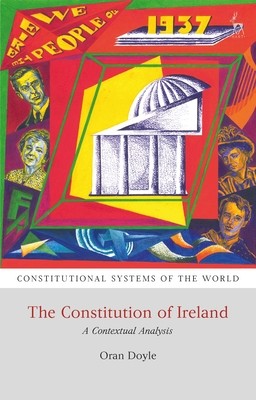
- We will send in 10–14 business days.
- Author: Oran Doyle
- Publisher: Hart Publishing
- ISBN-10: 1509903437
- ISBN-13: 9781509903436
- Format: 13.5 x 21.3 x 1.5 cm, minkšti viršeliai
- Language: English
- SAVE -10% with code: EXTRA
Reviews
Description
This book provides a contextual analysis of constitutional governance in Ireland. It presents the 1937 Constitution as a seminal moment in an ongoing constitutional evolution, rather than a foundational event. The book demonstrates how the Irish constitutional order revolves around a bipartite separation of powers. The Government is dominant but is legally constrained by the courts, particularly in their interpretations of the fundamental rights protected by the Constitution. In recent decades, the courts have weakened the constitutional constraints on the Government. Political constraints imposed by opposition parties in Parliament and new accountability institutions (such as the Ombudsman) have moderately strengthened but the Government remains by far the most powerful political actor. There is a risk that such executive dominance could lead to democratic decay; however, the referendum requirement for constitutional amendment has prevented Governments from accumulating greater constitutional power.
The book begins with an overview of Irish constitutional history leading to the enactment of the 1937 Constitution, before exploring the foundational decisions made by the Constitution in relation to territory, people and citizenship. Particular attention is paid to the constitutional relationship with Northern Ireland, currently unsettled by the decision of the United Kingdom to leave the European Union. The book details the key institutions of state (Government, Parliament, President and courts), before analysing how different constitutional actors exercise their respective powers of governance, contestation and oversight. A thematic approach is taken to the courts' interpretation of fundamental rights, showing how judicial attitudes have markedly changed over time. Further attention is paid to both formal amendment and informal constitutional change. The Constitution today is markedly different from 1937: it is non-committal on national reunification, less influenced by Roman Catholic natural law teaching, and generally more permissive of Government action. It is perhaps these developments, however, that explain its continued success or, at least, its longevity.EXTRA 10 % discount with code: EXTRA
The promotion ends in 23d.16:06:32
The discount code is valid when purchasing from 10 €. Discounts do not stack.
- Author: Oran Doyle
- Publisher: Hart Publishing
- ISBN-10: 1509903437
- ISBN-13: 9781509903436
- Format: 13.5 x 21.3 x 1.5 cm, minkšti viršeliai
- Language: English English
This book provides a contextual analysis of constitutional governance in Ireland. It presents the 1937 Constitution as a seminal moment in an ongoing constitutional evolution, rather than a foundational event. The book demonstrates how the Irish constitutional order revolves around a bipartite separation of powers. The Government is dominant but is legally constrained by the courts, particularly in their interpretations of the fundamental rights protected by the Constitution. In recent decades, the courts have weakened the constitutional constraints on the Government. Political constraints imposed by opposition parties in Parliament and new accountability institutions (such as the Ombudsman) have moderately strengthened but the Government remains by far the most powerful political actor. There is a risk that such executive dominance could lead to democratic decay; however, the referendum requirement for constitutional amendment has prevented Governments from accumulating greater constitutional power.
The book begins with an overview of Irish constitutional history leading to the enactment of the 1937 Constitution, before exploring the foundational decisions made by the Constitution in relation to territory, people and citizenship. Particular attention is paid to the constitutional relationship with Northern Ireland, currently unsettled by the decision of the United Kingdom to leave the European Union. The book details the key institutions of state (Government, Parliament, President and courts), before analysing how different constitutional actors exercise their respective powers of governance, contestation and oversight. A thematic approach is taken to the courts' interpretation of fundamental rights, showing how judicial attitudes have markedly changed over time. Further attention is paid to both formal amendment and informal constitutional change. The Constitution today is markedly different from 1937: it is non-committal on national reunification, less influenced by Roman Catholic natural law teaching, and generally more permissive of Government action. It is perhaps these developments, however, that explain its continued success or, at least, its longevity.

Reviews